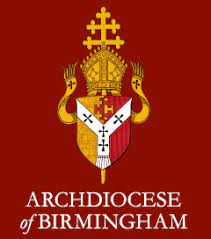Aims, Values & Ethos
Ethos
The school was founded by and is part of the Catholic Church. The school is to be conducted as a Catholic school in accordance with canon law and teachings of the Roman Catholic Church, and in accordance with the Trust Deed of the Archdiocese of Birmingham and in particular –
- religious education is to be in accordance with the teachings, doctrines, discipline and general and particular norms of the Catholic Church;
- religious worship is to be in accordance with the rites, practices, discipline and liturgical norms of the Catholic Church; and at all times the school is to serve as a witness to the Catholic faith in Our Lord Jesus Christ.
Aims
Our broad aims are:-
- to give each child, according to his ability, a firm grasp of basic skills and to give many opportunities to develop creative ability and talent;
- to develop each child’s individual personality so that he/she has an awareness of life and an ability to cope with his/her talents and weaknesses;
- to give the child confidence and assurance so that he/she is able to develop satisfactory relationships;
- to provide in school an environment which enables these things to develop and one which makes the children feel happy and secure.
Values
‘School should promote the fundamental British values of democracy, the rule of law, individual liberty and mutual respect and tolerance of those with different faiths and beliefs’ (DfE Departmental advice Nov.2014).
St Mary’s promotes the fundamental British values. Our staff model the values through their own behaviour and teach the values implicitly through every aspect of the curriculum, ensuring equality and excellence for all pupils.
The Governing Body ensures that these values are reflected and implemented effectively in school policy and practice and that there are effective risk assessments in place to safeguard and promote pupils’ welfare.
Democracy
Democratic values are an explicit part of the ethos of St Mary’s School. All adults listen to the views of the pupils and value their opinions. Pupils have further opportunity to have their voices hear through the School Council. The elections of School Council are the result of pupil votes and these groups canvas the opinions of their peers.
Rule of Law
The importance of laws and rules are consistently reinforced in the classroom, as well as through school assemblies. Pupils are taught to understand the need for laws, that they are there for individual protection, the responsibilities that this involves and the consequences when laws are broken. Pupils follow a positive behaviour policy and clearly understand the rewards and sanctions that are used. Assemblies and discussions in class focus on recognising right from wrong and visits from the Police and other community representatives help to reinforce these messages.
Individual Liberty
Pupils are encouraged to be independent learners, constantly making choices, within a safe and supportive environment. Developing their self-esteem and self-confidence is very important. Pupils are encouraged to understand their personal freedoms and are taught how to use these rights to best effect. All pupils are keen to support charities – local, national and global. They are taught consideration for others through the Religious Education curriculum and PSHE lessons in particular. E-Safety teaching enables them to make choices in a safe manner
Tolerance & Mutual Respect
The school’s ethos and behaviour policy are based on Gospel values, with the important commandment being, ‘Love one another as I have loved you’. Assemblies constantly promote respect for others and the importance of good manners. All pupils are taught the importance of self-respect, honest and open communication with others and fair play. Pupils work collaboratively and value others’ opinions.
As a Catholic community, pupils are reminded of their place in a culturally diverse society. This is achieved through the Religious Education curriculum and the spiritual life of the school. Assemblies and class work promote the diversity of society and the right for each person to be respected and valued equally regardless of ability, gender, faith, heritage or ethnicity.
March 2019



